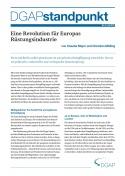Decisive Progress in European Defense
If implemented, this decision will have far-reaching consequences – in European politics as well as for industrial policy. It asserts Franco-German leadership in the EU and underlines the willingness of both countries to make progress in European defense.
The importance of this decision goes far beyond the question of which weapon system the French and the Germans will be using over the next 40 or 50 years – the usual lifespan of this kind of aircraft. Military aviation is the key defense industrial sector in terms of financial volume and innovation. By launching the new European fighter program, Germany and France are preserving the chance of building a truly autonomous defense industry in Europe, which would otherwise depend increasingly on US firms. European autonomy is thus getting one step closer.
With this decision, Macron and Merkel underline that they consider themselves pioneers by initiating a step change. By announcing the joint fighter jet project, they have given a European defense policy, which so far consisted of loose declarations of intent, tangible (industrial) credibility. And they are offering a concrete project that others can join. After getting this off the ground, Berlin and Paris can rightfully expect that other countries shake off their national restraints and either participate or even Europeanize their own projects.
Yes to Europe, Bye-bye to Washington and London
The German-French project is not only a commitment to Europe, but also a twofold rejection: of the US and the United Kingdom. For the US, the construction of a European fighter jet means that Paris, Berlin, and possibly a great number of other European countries will not buy US-built fighter aircraft. Berlin had considered procuring fighter jets from American manufacturers, also to demonstrate its close partnership with the US. Yet, it is almost unthinkable and too expensive to operate two aircraft models at the same time. What is more, Berlin will be a central industrial player in this European project, while it otherwise would only remain a procurer of US end-products – somewhere at the far end of the supply chain. Spending of German tax-payers money would have neither led to technological advances nor job-creation. With this European project, however, Germany now has to opportunity to develop its own military high-tech and keep its defense industry innovative and competitive.
Launching this new project Paris is also turning down London. The UK is unlikely to take part in one of the most important European projects of the next decades, even though London considers itself as the traditionally predominant military power in Europe and as France’s privileged partner. In industrial-technical terms, British participation would be possible, because third countries (i.e. non-EU countries) are welcome to join the project. Politically, however, British participation is unthinkable. Paris and Berlin have consciously designed and framed this project as an European commitment, pursuing a key European goal as trailblazers and thus sending a strong signal for more cooperation in Europe instead of exclusively bilateral approaches. For a UK leaving the EU, precisely because of too much European cooperation, there is no place.
Trump’s positions on NATO and London’s anti-EU rhetoric have led to an immense loss of trust of the continental Europeans in their allies, which is proving to be the driver for a once unimaginable cooperation in the defense sector.
Don’t Get Too Excited, Though
Politically, industrially, and strategically, the project is destined for success, as it is “too big to fail.” Nevertheless, one needs to be cautious as the risks are multifaceted. A completely novel fighter jet is being developed which is a highly-challenging endeavor. Research and development processes always provide unwelcome surprises and setbacks. This is the price for European autonomy.
Also, the history of Franco-German defense cooperation has so far been marked by failures. The reasons: short-term, national industrial interests, fights over production locations, and the belief that one’s own military personnel can only fight with their national material. Consequently, the present European defense sector is highly fragmented. This European project is large enough, however, to end parish-pump politics. Germany and France will together spend at least €60 to €80 billion over the first 30 years and thus incentivize industries not to pursue small national projects but to take part in this larger transnational endeavor.
As experiences with European defense projects such as the A400M demonstrate, European industry did not always deliver on quality, cost stability, or punctuality in recent years. The goal therefore needs to be reestablishing trust between governments and companies quickly.
For a Responsible Defense Policy
The political and economic significance of the new aircraft project will bear even more fruit if more partners get involved. Conceivable partners are Spain and possibly Sweden. But also Japan is a thinkable option. Berlin, however, needs to offer an important prerequisite: a national consensus on the role of armaments in Germany’s defense policy. Without a reliable national armament policy there will be no European defense policy. However, such a European policy is something that almost all German political parties call for. Deeper cooperation with the French or other Europeans demands the German government to clearly explain how Germany intends to contribute to joint armament projects. Since Europe’s defense industries can only survive through exports outside of Europe, a future-proof policy on armament exports should be high on the agenda of Germany’s next government.
